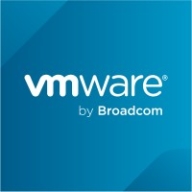

Hyper-V and VMware ESXi are leading competitors in the virtualization category. VMware ESXi is typically favored for extensive infrastructures due to its advanced features while Hyper-V stands out as a cost-effective solution primarily suitable for smaller entities.
Features: Hyper-V offers practical features such as Hyper-V Replica, which can replace SAN, dynamic memory allocation, and live migration for seamless workload transition. VMware ESXi impresses with vMotion, which facilitates maintenance without downtime, and high availability that ensures continuous operations.
Room for Improvement: Hyper-V requires enhanced licensing models, more streamlined management, and improved storage solutions. VMware ESXi can benefit from reducing the high costs associated with its current licensing model, simplifying setup procedures, and adding more cost-effective management tools post-acquisition by Broadcom.
Ease of Deployment and Customer Service: Hyper-V is easy to deploy especially for on-premises solutions, although technical support quality can vary. VMware ESXi suits hybrid cloud environments, offering management ease and consistency in service, though similar support challenges exist.
Pricing and ROI: Hyper-V is considered more cost-effective, with its free option lowering initial investments and yielding a favorable ROI through reduced hardware costs. VMware ESXi, despite its higher expense, delivers significant ROI for large-scale deployments due to its robust features, albeit with criticisms over its expensive licensing fees.
You need only one physical server that can host several virtualized servers within the same physical server instead of having multiple physical servers.
Technical support from Microsoft is excellent, rated ten out of ten.
The technical support for Hyper-V is excellent
The technical support is very good
I rate the technical support from VMware as nine or ten out of ten.
In the last three or four years, we did not require any support from VMware engineers, indicating its high reliability.
Customer service and support are good; they are reachable, and at times remote support suffices.
Hyper V can support over two hundred virtual processors and around 12 TB of memory.
The scalability of Hyper-V is great; I would rate it nine out of ten.
The solution is scalable, allowing us to scale up or down regardless of infrastructure size.
vCenter Server can manage up to 1,000 ESXi servers within a single UI interface, allowing extensive deployment and management capabilities.
My customers are highly satisfied with its scalability.
Automation is unavailable, and reporting is difficult.
Frequent Windows updates can impact stability compared to VMware ESXi.
ESXi is stable, and our business operations depend on it year after year.
Stability rates a perfect 10.
Hyper-V should ensure the features of VMware are covered within its platform.
Hyper-V could be improved by implementing the same set of features that other tools provide.
In future updates, I would like to see improvements in reporting and a resolution to some security weaknesses.
Providing a mobile application for remote access to ESXi servers would be beneficial.
It's not cost-effective for small users and creates a gap for alternatives, while favoring larger clients.
The cost of VMware ESXi is very high, especially after the acquisition by Broadcom, which led to price increases.
Hyper-V is completely free and requires no licensing fee.
Hyper-V's licensing costs are lower compared to VMware, making it cost-effective for smaller workloads.
Until 2019, Hyper-V was a cost-effective solution because it was available as a free product.
The product is very cost-effective, though not fixed, as pricing tends to fluctuate over time.
The solution is moderately priced, not exactly cheap yet not overly expensive either.
The pricing is expensive, with the cost for customers ranging from $10,000 to $20,000 yearly.
It is completely free, which is a significant advantage.
I have seen return on investment with Hyper-V because it is both time-saving and cost-effective.
It offers the stability needed for non-enterprise data centers and has improved over time.
Its capability to move virtual machines to physical machines is very efficient for our live environment.
As a level one or bare metal hypervisor, its unmatched scalability depends on underlying hardware, capable of managing large numbers of physical servers with one management platform.
vMotion is a daily used technology that allows us to have machines distributed across different sites while maintaining redundancy between the sites.
| Product | Market Share (%) |
|---|---|
| Hyper-V | 15.2% |
| VMware ESXi | 1.7% |
| Other | 83.1% |


| Company Size | Count |
|---|---|
| Small Business | 68 |
| Midsize Enterprise | 37 |
| Large Enterprise | 46 |
| Company Size | Count |
|---|---|
| Small Business | 12 |
| Midsize Enterprise | 5 |
| Large Enterprise | 14 |
Hyper-V is a hardware virtualization tool that allows users to create virtual computer environments with multiple operating systems on a single physical server. Each virtual machine has computer parts, such as memory, processor, storage, and networking, and acts like a standard computer - running its own operating system and software programs. Each component of the virtual machine can be configured to meet your specific requirements.
Hyper-V creates a cost-effective, stable, and productive server virtualization environment by running multiple operating systems, such as Windows, Linux, and more, in parallel on one machine or server. Each virtual machine runs in its own isolated space, which means you can run many virtual machines simultaneously but independently of each other. This helps prevent problems such as a crash affecting the other workloads and enables different users to separately access various systems.
Benefits of Hyper-V
Hyper-V key features:.
Reviews from Real Users
Hyper-V stands out among its competitors for a number of reasons. Several major ones are its flexibility, its replication capabilities, and the fact that its virtual machines utilize a small amount of resources..
Liam L., the owner of a tech services company, writes, “It is actually very low on resources. It doesn't use many resources. It is also very easy to tailor. You can change things like the amount of memory and storage on the fly. It is very stable and reliable. I like its replication feature, which is very good. It is also very easy to move the virtual machines across push servers without any difficulty. Its performance is also very good. Now with this pandemic, a lot of workers are working from home. A lot of workers have been using laptops as their desktop computers, and they would remote into a virtual PC. There is no difficulty, and they can't tell the difference between this and the real one. It is much easier to manage.”
Kevin E. an IT director at Homeland Technology Group, LLC, notes, “We've probably seen a 50 percent speed increase on our SQL server. Hyper-V has also significantly reduced our downtimes with faster boot-up and reboot. If we have to reboot a server, there is maybe two or three minutes of downtime. When we were on a bare-metal server, it could be five to ten minutes due to the total boot time.”
VMware ESXi serves as a hypervisor enabling virtualization by transforming physical servers into virtual infrastructures, supporting efficient server management, development, and production environments.
Organizations utilize VMware ESXi for its high availability and ability to host diverse workloads effectively. Known for stability and maturity, it efficiently handles server, networking, and storage demands, with integral features like vMotion and memory compression. ESXi integrates well with data center operations, allowing seamless resource allocation and virtual machine migration. Despite impressive capabilities, users encounter challenges with setup complexity, licensing costs, and technical support delays, leading some to explore different solutions.
What are the main features of VMware ESXi?
What benefits and ROI do organizations see with VMware ESXi?
Industries deploying VMware ESXi benefit in sectors requiring robust IT infrastructure, including finance, healthcare, and education. Its capability to support high availability and diverse workloads proves essential for critical applications, enhancing productivity and agility in dynamic environments.
We monitor all Server Virtualization Software reviews to prevent fraudulent reviews and keep review quality high. We do not post reviews by company employees or direct competitors. We validate each review for authenticity via cross-reference with LinkedIn, and personal follow-up with the reviewer when necessary.